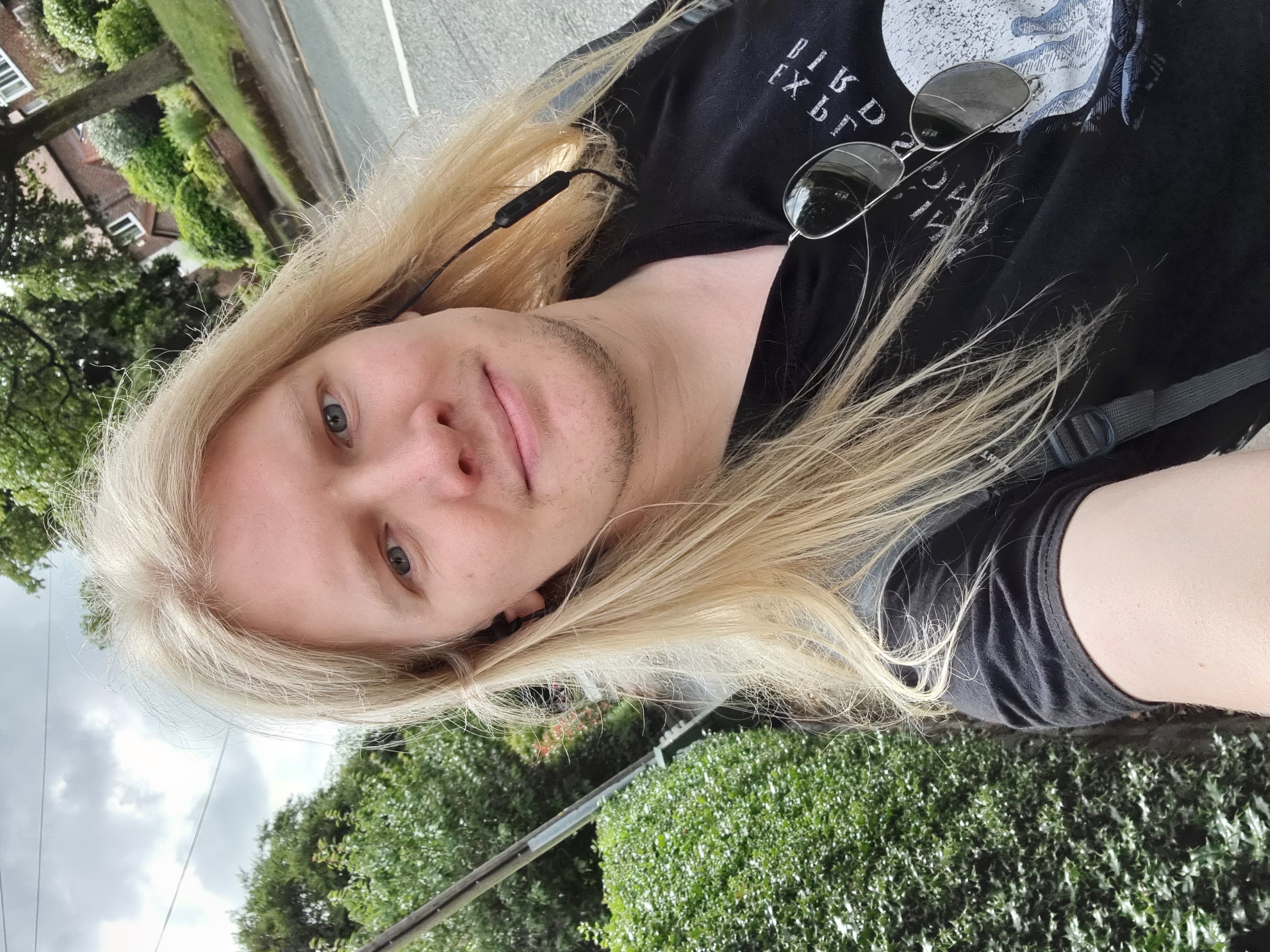Coheed And Cambria are reaching the end of their epic, 12-album Amory Wars concept with The Father Of Make Believe. With mainman Claudio Sanchez in a precarious position as he contemplates his future, it’s the band’s most out-there album yet – equal parts a sci-fi prog epic and personal tome of uncertainty.
While some bands’ vision for a concept record would stretches across a double album, that would barely scratch the surface for Coheed And Cambria. Founder, lead songwriter and tireless creative Claudio Sanchez mapped out an intergalactic odyssey with the intention of spreading it across 12 full-length releases. Save for the much-needed respite of 2015’s The Color Before The Sun – which temporarily unshackled the group from the chains of such a lofty concept – it’s driven the band’s existence for nearly a quarter of a century.
The 10th album in the band’s Amory Wars series, Vaxis – Act III: The Father Of Make Believe, finds the final straight in sight, with only two more instalments to follow. Naturally, that’s led to some pensive self-reflection for Sanchez.
“We’re now at the third part of this five-part thing, and I can almost see the end,” he says. “But what will my life be like without it?”
Set in another galazy, The Amory Wars story is bluntly described by Sanchez as the tale of “a fucked-up dysfunctional family in space.” But really, such high fantasy provides him with a mask to be vulnerable without baring all. “I had a really hard time putting myself at the forefront of the songs,” he admits. “That’s why I created The Amory Wars. I grew up on Emory Drive in a small town outside of New York City; the characters Coheed and Cambria very much resemble my parents. I play a character in the story.”
He continues: “Every life is nuanced, right? I grew up in a chemically dependent household. My dad was a functioning addict, so that’s where the dragonfly [a key creature within the story] came from – it resembles a syringe. The father turns into a monster, and the mother is a shield to protect the children.
“I never wanted to villainize the people I was singing about; but I needed to write music to feel good. This is a therapeutic thing for me. And as I got older and became a father, I started making peace with things. It’s my life – I should be able to speak about it.
As much as this isn’t the end, I see the end. I don’t know if it’s a metamorphosis into something that isn’t a prison, but there’s a way to move on
“I had a great upbringing despite the dysfunction. I thought it was fantastic to take moments in my life and make them these grandiose paintings of moments in time that I had experienced one way, but maybe the audience can experience in another.”
The band’s lyrics, as well as a series of novels and comic books, are the vehicles for his confessional storytelling, which has always been tailored to welcome new listeners with each album. Fans rooted deep into the lore will hear character themes and sonic nuggets oscillate through their discography; but for those who just want music to digest and enjoy, the band’s mix of emotional post-hardcore and very nerdy prog has proven a winner.
“Early on, I attempted to try to inject concept jargon into songs, and I didn’t really love that,” Sanchez says. “It felt a little forced. I wanted it to be a surprise that there was a bigger concept. It’s more suggestive than necessary.”
As he dove deeper into the chaotic narrative arc, the music became more ambitious. “I feel like we’ve constructed the freedom to do whatever it is we choose to do creatively,” he says. “That’s always something that I’ve strived for. I never wanted there to be restrictions. But then there’s the question of, ‘Did I imprison myself in the concept?’”
Unsurprisingly, he answers this question in musical form with So It Goes, the final song on the new record. “It’s a phrase from Kurt Vonnegut’s Slaughterhouse-Five, which only gets mentioned in conjunction with something dying. I was very much influenced by that. Some of those stories have really inspired some of the motives in The Amory Wars – one being the character of Billy Pilgrim being unstuck in time and being able to see everything at once.
“And so for me, as much as this isn’t the end, I see the end. I don’t know if that end is finite, or if it’s a metamorphosis into something that isn’t a prison, but there is a way to move on to something else.”
To get to that answer, first he had to make sense of the lyrics that passed through his lips. “A big theme in Coheed records is identity and mortality. And the older I get, those themes become louder. I understood what conceptually was supposed to happen with the story, but initially I was writing without the rules of the story.
“I found a very personal theme of questioning who I am and where I would be if I’d made different decisions along the way. When I was listening to the material, it was like going through some sort of mid-life crisis. I was asking, ‘Do I want to be in Coheed And Cambria any more? Do I want to try a different avenue of creativity?’ That theme made a lot of sense for me, being at the centre point of this pentalogy.”
When I write I like to cover a lot of ground; I think that might make Coheed a hard pill to swallow
As ever, Coheed’s latest batch of songs are highly fantastical, but it doesn’t take much to understand the meanings. “Goodbye, Sunshine is about saying goodbye to a thing that is really important to you. But it’s followed by Searching For Tomorrow, which is about looking for a better existence past that,” he explains. “There’s a real duality to the record.”
Having found meaning in his subconscious writing, Sanchez returned to Paris, where the initial concept for The Amory Wars was created. He jokes that, in 1998, the city was “another world” to the young, impressionable musician, having previously only travelled as far as New Jersey, his neighbouring state. He spent 10 days in the French capital, exploring, writing, reconnecting with Coheed And Cambria’s roots.
“Paris will always be important to me,” he reflects. “Every once in a while, I’ll return there and see if I’m inspired by anything. Some of The Afterman story [2012/13] was written there. This time I went on a writing retreat, and I wrote Meri Of Mercy and Blind Side Sunny there. They almost act as the binding of the album.
“They’re right in the middle and they’re extremely different. One is very pretty and airy – something about the textures in Meri Of Mercy reminded me of my grandfather passing, and maybe somewhere in the afterlife being reunited with the wife he’d lost for 40 years. Blind Side Sunny is aggressive and gritty.
“When I write music I like to cover a lot of ground, and I think that sometimes might make Coheed a hard pill to swallow. It really doesn’t fall into one category, but it resembles my personality. There are moments when I can be open and soft, and moments when I can be aggressive. It’s important to showcase both sides. Again, this is therapy.”
Amid his self-wrangling, Sanchez has greatly expanded Coheed’s musical spectrum on The Father Of Make Believe. He points to album opener Yesterday’s Lost. “It’s a very conscious effort to reintroduce The Afterman’s theme, and it’s very [folk singer] Iron & Wine-y. There was an instrument in the background, called the Therevox, which emulates an old French analogue synthesiser; I used a little bit of that to create some otherworldliness.”
It’s not the only oddball instrument that makes its way onto the record. “I’ve got stuff everywhere! When I was doing The Flood, I needed something that sounded like water, so I used a waterphone [a strange, spiralling instrument that looks like it should be in a modern art gallery]. You fill it with water and bow it. It sounds alien. I like trying to find instruments and textures that aren’t obvious; they sit in the background and really paint a visual picture.
“I also used a box instrument called an apprehension engine. It’s something that Mark Korven [composer for the Robert Eggers horror films The Lighthouse and The Witch] made. It’s a scary instrument!”
As much as I’m questioning my identity and myself inside Coheed And Cambria, we are stronger together
They’re vehicles to push Coheed’s sound as far as possible. “For me, there isn’t any other contemporary music that moves quite like Coheed does,” he says. “There’s a lot of peaks and valleys, and I feel that’s something a lot of music lacks – the complexity of movement and vibes. I feel we cover a lot of ground in a very creative and interesting way.”
The Flood helps support that claim: it’s part of the thrilling, near-20-minute, four-part masterwork The Continuum, which closes out the record and the third part of The Amory Wars saga. “Going over those questions of growth and identity, I felt the song really amplified that,” Sanchez explains. “Mr Nobody is a very self-deprecating acceptance of ‘You’ll forever be known as nothing.’ That’s the hyper side of the spectrum.
“Part two, The Flood, was almost like a rebirth. It reminded me of a horrible acid trip when I was a teenager – I saw my life flash by in these still pictures, to the point where I found myself as an orb of energy, like it was the nucleus of my id or my ego. And then I was abruptly awakened from it. I think I was out of my mind on a couch somewhere and somebody was afraid I was dying.
“Then we get to Tethered Together, which, as much as I’m questioning my identity and myself inside Coheed And Cambria, we are stronger together – and that feels like the climax of the story. Whereas So It Goes becomes the resolve; regardless of everything, we still move on. That’s why I thought conceptually the four movements really worked together – they give closure to this record.
“I feel a personal connection to all Coheed records,” he adds. “But this one resonates differently.”







